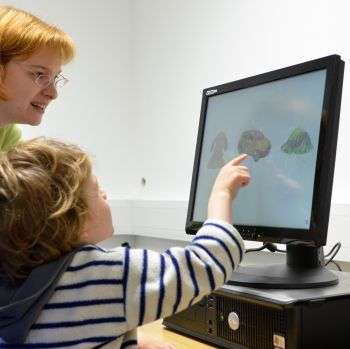Study shows 'less is more' for kids learning new words

(Medical Xpress)—Toddlers are much more successful at learning new words when the learning environment stays the same, according to new University of Sussex research.
Much recent research has shown that less is more as far as children's learning is concerned. Now Sussex psychologists Dr Jessica Horst and post-doctoral fellow Dr Emma Axelsson have shown that this is also true for learning individual words.
Their study published online this week (3 September) in the journal Acta Psychologica, involved 48 three-year-old children. Simulating a game on a touchscreen computer, the children were introduced to names for unusual toys – such as a clacker (noisemaker) – by being asked to touch different toys to help an alien 'tidy up his room'.
They heard the name of a new toy and then had to choose it from two other objects displayed on the screen. Children saw familiar things such as toy cars and plush animals alongside the unusual toys.
All children heard the new words the same number of times, but sometimes the familiar objects were always different and sometimes they were always the same. For example, some children always saw the clacker with the elephant and boat and some children always saw that toy with different things.
The children who had less distraction - those who always saw things with the same other objects - learned the words. The children who encountered more distraction did not learn the words.
Dr Horst says: "Across developmental psychology we are seeing two big shifts in the research on how children learn. Several studies—including ours—are finding that less is more when it comes to learning.
"Children learn more information and learn it better when their learning environments are less distracting. They do not need many bells and whistles: they are naturally active learners. For example, recent research has found that children learn better at home when the TV is turned off and are more attentive at school when classrooms are plainly decorated.
"Our current study suggests that it can be highly beneficial for children to play with the same group of toys over and over again—as long as they are interested. So, for example, if your child always plays with the same pots and food within the play kitchen, this is fine.
"Children are actually really good at knowing what helps them learn. They'll let us know when they are bored and when to move on to something new.This study also demonstrates why learning through play is so valuable for children."
Dr Axelsson, now at Australia National University, adds: "Sometimes children might just guess the meanings of words, but when they do this repeatedly in the same environments, like when they guess the meaning of the word thermometer in the context of the word dummy and bottle, over time the connection between the word and object is strengthened.
"Guessing the meaning of words in a neat environment of a touchscreen can provide a supportive learning platform for children."
The research was funded by the Economic and Social Research Council. It builds on previous research in Dr Horst's lab showing that children learn more words when they see fewer objects at once and that children learn more words when they hear the same stories repeatedly rather than several different stories.
More information: 'Contextual repetition facilitates word learning via fast mapping' By Dr Jessica Horst and Dr Emma Axelsson, is published online in Acta Psychologica on 03 September 2014. (Print edition scheduled for October 2014).



















